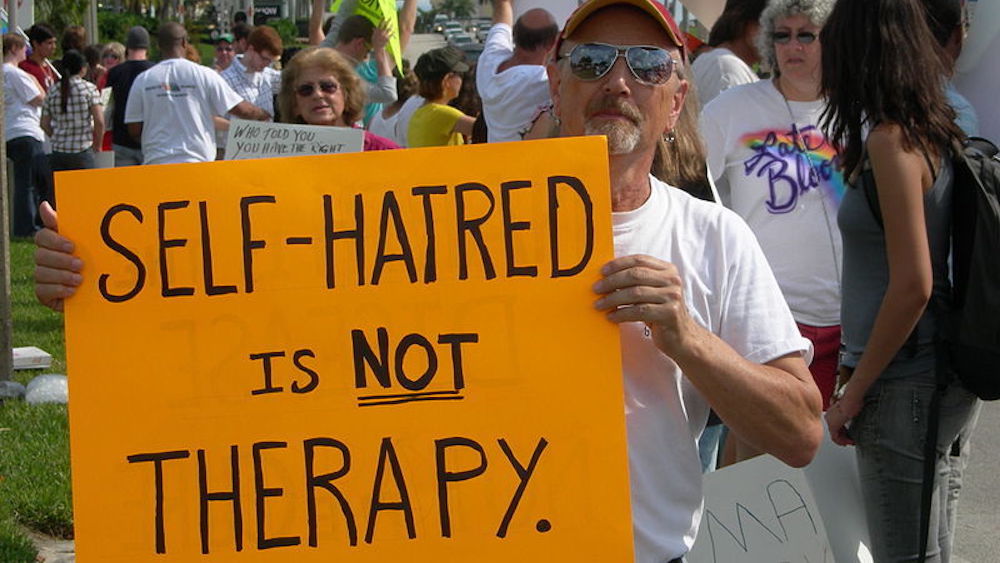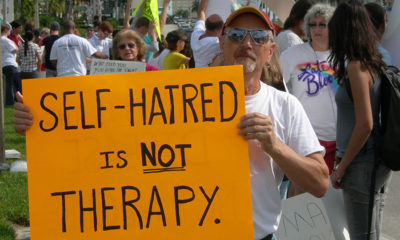ABOUT TIME
Facebook & Instagram Ban All Content Promoting So-Called “Ex-Gay” Conversion Therapy

On Friday, Facebook and Instagram announced a ban on all videos, images, and written content promoting so-called “ex-gay” conversion therapy or reparative therapy, a widely disavowed and debunked form of psychological torture that purports to change someone’s sexual orientation or gender identity.
The social media giant which owns both platforms said that the ban was merely an expansion of its policies banning hate speech and a progression of its pre-existing ban on conversion therapy ads.
“We don’t allow attacks against people based on sexual orientation or gender identity and are updating our policies to ban the promotion of conversion therapy services,” said Tara Hopkins, Instagram’s public policy director for Africa, Europe and the Middle East, although the ban will apply to the U.S., South America and Australia as well.
Although Twitter and Vimeo both have bans on similar content, it’s unclear whether YouTube does as well. The Google-owned video-sharing platform came under fire in June 2018 for running conversion therapy ads before videos made by LGBTQ content creators. At the time, the platform said it didn’t allow ads that promote hatred or illegal services, but that could feasibly allow such ads to continue running in the 30 states where the practice remains legal.
Religious conservatives have previously fought bans on the practice as violations of their constitutionally protected rights to “free speech” and “religious freedom.” Proponents say that people should have the right to rid themselves of “same-sex attraction” and “gender confusion.”
However, the actual methods of ex-gay therapy have never been proven to actually change anyone’s sexual orientation or gender identity. Such programs often tell clients to avoid masturbation, to exercise to exhaustion, to view queerness as physically disgusting or threatening to one’s health, or to “reframe” one’s desire onto opposite-sex partners. Other practitioners have used electroshock therapy, molestation, sexual assault, forced medication, or strict gender-typed dress and grooming codes to try and change people.
A 2013 survey said 84 percent of former ex-gay therapy clients still feel lasting shame and emotional harm from undergoing such “therapies.” Numerous conversion therapy advocates later come out as still gay, admitting that it doesn’t work and apologizing for ruining lives while lying to people about its effectiveness.
Most Americans oppose conversion therapy and almost every major American psychological, health and pediatric association does as well. In the past, the U.S. Supreme Court has refused to hear cases challenging the constitutionality of conversion therapy bans as violations against religious freedom, but it remains unclear whether the court will continue to refuse such cases now that it has a more conservative majority.
While the bans are helpful, some states still allow the harmful practice to be marketed towards adults or to everyone under the guise of “religious counseling.” Even states that ban the practice still allow abusive “teen discipline” work camps where parents send their queer and “troubled” youth to be “straightened out.”
Featured image by Daniel Tobias. (CC BY-SA 2.0)
Enjoy this piece?
… then let us make a small request. The New Civil Rights Movement depends on readers like you to meet our ongoing expenses and continue producing quality progressive journalism. Three Silicon Valley giants consume 70 percent of all online advertising dollars, so we need your help to continue doing what we do.
NCRM is independent. You won’t find mainstream media bias here. From unflinching coverage of religious extremism, to spotlighting efforts to roll back our rights, NCRM continues to speak truth to power. America needs independent voices like NCRM to be sure no one is forgotten.
Every reader contribution, whatever the amount, makes a tremendous difference. Help ensure NCRM remains independent long into the future. Support progressive journalism with a one-time contribution to NCRM, or click here to become a subscriber. Thank you. Click here to donate by check.
 |




















